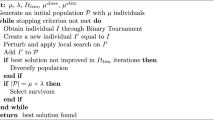Abstract
This paper presents a memetic algorithm (MA) to minimize the total weighted number of late jobs (or deliveries) on a single machine. The proposed MA combines a genetic algorithm (GA) with a neighborhood search. The performance of the proposed algorithm is compared with four heuristics from the literature, namely the early due date (EDD), the weighted shortest processing time (WSPT), the forward algorithm (FA), and the weighted forward algorithm (WFA), against 10 benchmark problems and three real-world problems. The results suggest that the MA outperformed the EDD, WSPT, FA, and WFA on the benchmark problems and performed as good as WFA on two of the three real-world problems and outperformed WFA on one real-world problem. The EDD performed the worst among the five solution approaches.
Similar content being viewed by others
References
Karp RM (1972) Reducibility among combinatorial problems. In: Miller RE, Thatcher JW (eds) Complexity of computer computations. Plenum, New York, pp 85–103
Smith WE (1956) Various optimizers for single stage production. Nav Res Logist Q 3(1):59–66
Moore JM (1968) An n job one machine algorithm for minimizing the number of late jobs. Manag Sci 15:102–109
Phojanamongkolkij N, Grabenstetter D, Ghrayeb O (2003) Scheduling jobs to improve weighted on-time performance of a single machine. J Manuf Syst 22:148–156
Lenstra JK, Rinnooy Kan AHG, Brucker P (1968) Complexity of machine scheduling problems. Ann Discrete Math 1:343–362
Baptiste P (1999) Polynomial time algorithms for minimizing the weighted number of late jobs on a single machine when processing times are equal. J Scheduling 2(6):245–252
Sahni S (1976) Algorithms for scheduling independent jobs. J ACM 23:116–127
Villarreal FJ, Bulfin RL (1983) Scheduling a single machine to minimize the weighted number of tardy jobs. IIE Trans 15:337–343
Tang G (1990) A new branch and bound algorithm for minimizing the weighted number of tardy jobs. Ann Oper Res 24:225–232
Potts CN, Van Wassenhove LN (1988) Algorithms for scheduling a single machine to minimize the weighted number of late jobs. Manag Sci 34:843–858
M’Hallah R, Bulfin RL (2003) Minimizing the weighted number of tardy jobs on a single machine. Eur J Oper Res 145:45–56
Lin BMT, Cheng TCE (1999) Minimizing the weighted number of tardy jobs and maximum tardiness in a relocation problem with due date constraints. Eur J Oper Res 116:183–193
Peridy L, Pinson E, Rivereau D (2003) Using short-term memory to minimize the weighted number of late jobs on a single machine. Eur J Oper Res 148:591–603
Sadykov R (2008) A branch-and-check algorithm for minimizing the weighted number of late jobs on a single machine with release dates. Eur J Oper Res 189:1284–1304
Dauzere-Peres S, Sevaux M (2003) Using Lagrangian relaxation to minimize the weighted number of late jobs. Nav Res Logist 50(3):273–288
M’Hallah R, Bulfin RL (2007) Minimizing the weighted number of tardy jobs on a single machine with release dates. Eur J Oper Res 176:727–744
Sevaux M, Dauzere-Peres S (2003) Genetic algorithms to minimize the weighted number of late jobs on a single machine. Eur J Oper Res 151:296–306
Gordon VS, Werner F, Yanushkevich OA (2001) Single machine preemptive scheduling to minimize the weighted number of late jobs with deadlines and nested release/due date intervals. Oper Res 35:71–83
Brucker P, Kovalyov MY (1996) Single machine batch scheduling to minimize the weighted number of late jobs. Math Methods Oper Res 43:1–8
Vakhania N (2009) Scheduling jobs with release times preemptively on a single machine to minimize the number of late jobs. Oper Res Lett 37(6):405–410
Wan G, Yen B (2009) Single machine scheduling to minimize total weighted earliness subject to minimal number of tardy jobs. Eur J Oper Res 195(1):89–97
Valente J, Gonçalves JF (2009) A genetic algorithm approach for the single machine scheduling problem with linear earliness and quadratic tardiness penalties. Comput Oper Res 36(10):2707–2715
Baptiste P, Pape CL (2005) Scheduling a single machine to minimize a regular objective function under setup constraints. Discret Optim 2(1):83–99
Kethley RB, Alidaee B (2002) Single machine scheduling to minimize total weighted late work: a comparison of scheduling rules and search algorithms. Comput Ind Eng 43(3):509–528
Bean JC (1994) Genetics and random keys for sequencing and optimization. ORSA J Comput 6:154–160
Gen M, Cheng R (1997) Genetic algorithms and engineering design. Wiley, New York
Chakraborty UK, Deb K, Chakraborty M (1996) Analysis of selection algorithms: a Markov chain approach. Evol Comput 4(2):133–167
Chakraborty UK (2009) Minimizing flow time in permutation flow shop scheduling with improved simulated annealing. Proc. IEEE Congress on Evolutionary Computation, pp. 158–165.
Author information
Authors and Affiliations
Corresponding author
Rights and permissions
About this article
Cite this article
Ghrayeb, O., Damodaran, P. A hybrid random-key genetic algorithm to minimize weighted number of late deliveries for a single machine. Int J Adv Manuf Technol 66, 15–25 (2013). https://doi.org/10.1007/s00170-012-4302-1
Received:
Accepted:
Published:
Issue Date:
DOI: https://doi.org/10.1007/s00170-012-4302-1




